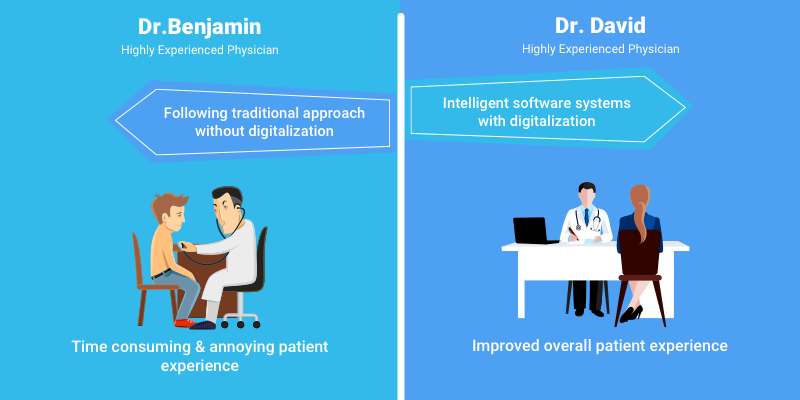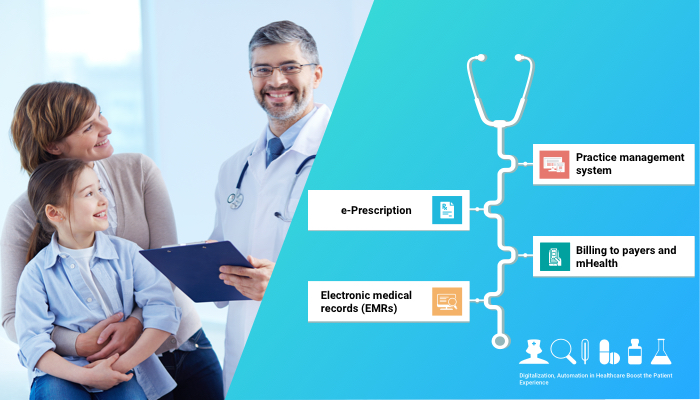“The good physician treats the disease; the great physician treats the patient who has the disease. – William Osler, a famous Canadian physician” How true these lines are! It is so necessary to think beyond the clinical needs of the patients.
It’s all about how the patients are treated and made to feel. Let’s consider a hypothetical scenario. There are two highly experienced and popular doctors in the city, Mr. David and Mr. Benjamin. Recently, Mr. David has started incorporating some intelligent software systems in healthcare that use digitalization to improve the overall patient experience. To ensure that patients don’t wait in the long queues, Mr. David has started using a patient scheduler mHealth app. For saving their medical records, bills, etc., Mr. David has incorporated a digital system, so that even if patients forget or misplace their documents, all the records will remain intact. However, Mr. Benjamin is still following the same traditional methods to approach and treat the patients.
What do you think? Whom will the patients prefer over time?
Technology is making a massive difference in the healthcare industry. Automation, healthcare IoT and other technological advances are greatly improving the medical practices and ultimately the patient experience.
What Factors Enhance the Patient Experience in Hospitals?
Along with in-hospital experience, patients are also influenced by pre and post-treatment experience. Technology can be used to engage the patients by providing them proactive information and guidance about their health conditions or appointments with doctors through dedicated medical apps. There are mobile apps that make it easier for patients to approach the facilities of the hospital. Likewise, to get feedback about what makes them satisfied, it is necessary to talk to them and also conduct surveys to get better information.
Today, advanced technology is playing a crucial role in enhancing the patient experience. Using digital transformation and IoT in healthcare can help to organize the patients as well as the hospital staff. A mobile app that is designed for scheduling doctor appointments enables the patients to do it sitting at their homes in their available time zones. Digitally managed clinic staff schedule software improves the communication between staff and enables them to handle more tasks without any hassle. Electronic medical records or EMRs are helpful in saving digital versions of different medical papers, charts, etc. related to patients.
When hospitals and clinics incorporate such tools and technologies, it certainly improves the quality and efficiency of care. However, the safety and security of the data is an important factor in healthcare. So,
healthcare apps need to be HIPAA compliant. The data like personal information of patients (like their names, contact details, etc.) and other medical information in the hospitals must be protected. This can be assured when the apps are HIPAA compliant.
How Digital Technology Influences Patient Experience?
Digital technology is a key enabler of a successful patient journey. Many hospitals have already started using certain tools, software, apps, etc. for enhancement of overall patient experience; a few of them are specified here.
Electronic Medical Records (EMRs)
EMRs have been playing an important role in improving the healthcare industry. EMR is a tool that digitalizes patient records and keeps track of the vital information related to patients. These files and records can be accessed and used by concerned doctors to provide the care quickly and accurately. EMRs increase efficiency and they reduce documentation errors. The doctors and other staff don’t need to spend time in searching records in files, as the information is available at the click of fingertips through EMRs.
Practice Management System in Healthcare
Practice management system in healthcare (or PMS) is software that deals with several day-to-day tasks of clinics and hospitals. PMS helps to automate some tasks like paying and tracking bills, documenting clinical tasks, maintaining a list of insurance payers, measuring practice performance of doctors, etc. It can also be used in automating the tasks at multiple branches of a hospital.
Practice management system in healthcare helps to streamline many time-consuming tasks which ultimately increases productivity and provides better ROI.
A good example of PMS is an emergency physician scheduler mobile app. Such an app connects the patients to doctors within minutes in case of emergency and their lives can be saved. At other times, the doctors can guide the patients to take precautions to avoid any bad health conditions.
Investment in a PMS will always be a cost-effective decision as it helps to manage multiple tasks of the staff members. Wearable technology, monitoring equipment, etc. embedded with IoT in healthcare play a vital role in tracking patient health. The reports of their health are automatically saved and reminders are sent to the concerned departments. When PMS is integrated with EMR, scheduling different tasks, billing, etc. becomes much faster and easier.
Billing to Payers and mHealth
When patients have any insurers or third-party payers involved while paying the hospital bills, billing to payers and mHealth (mobile health) facility automates some tasks. Depending on the insurance policy, that the patient has a tie-up with, a particular billing amount is automatically deducted and the patients can instantly pay the remaining amount. mHealth is also useful in guiding and educating the patients, giving reminders of appointments, taking feedbacks from them, providing remote care to them, etc. It is necessary to develop mHealth apps that are HIPAA compliant for the protection of all the medical data. HIPAA compliant apps build trust in patients.
Home Healthcare and e-Prescription
Home healthcare includes various services like monitoring health status, assisting in daily activities, medical tests, wound care, etc. which are provided to patients in their homes. An example of a home healthcare app is Phlex65. The senior citizens may find it difficult to get professional caregivers instantly in case of an emergency.
Phlex65 connects them with caregivers in real-time whenever necessary. Caregivers can guide them in daily activities like personal care grooming, assisting in the transfer, taking medicines on time, cooking, assistance with bathing, light housekeeping, etc. The caregivers can also take them to doctors in case of emergency.
In case of emergency, when patients cannot visit a hospital, the doctors can instantly send e–Prescription to them for time being a relief. It is directly sent to the pharmacies through dedicated software. Instead of waiting for handwritten prescriptions, the electronic prescriptions also help to avoid the errors which sometimes result in the selection of incorrect medicine or dosage and omission of certain information.
As a preventive measure, people can use wearable devices like heart rate and blood pressure monitoring cuffs, glucometer, etc. to check their fitness levels, track heartbeats, monitor glucose levels, etc. Whenever the levels are below or above the normal limits, these wearable devices send the data to patients and make them aware of it. The patients can immediately take e-Prescription from the doctors and consume preventive medicines. IoT plays a crucial role here as devices are connected to software systems to provide accurate health information.
Conclusion
Profits of a hospital are directly proportional to the satisfaction of patients. So, it has become crucial for hospitals to be proactive and incorporate advanced technology. To survive in the cut-throat competition, hospitals have to take steps to deliver special care experience to their patients. Digital technologies like EMRs, PMS, patient scheduler apps, e-Prescription, mHealth, etc. are transforming the healthcare industry at a fast pace. They give more power to the patients to choose the best for them in their convenience. These are more efficient and save a lot of time of both- the patients and hospital staff.
Ultimately, the hospitals delivering the best patient experience using digital tools will be the ones who excel and profit.



